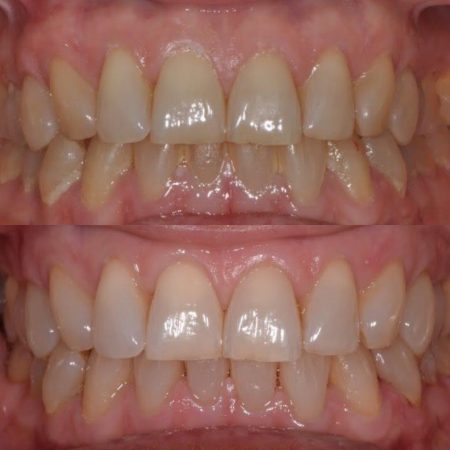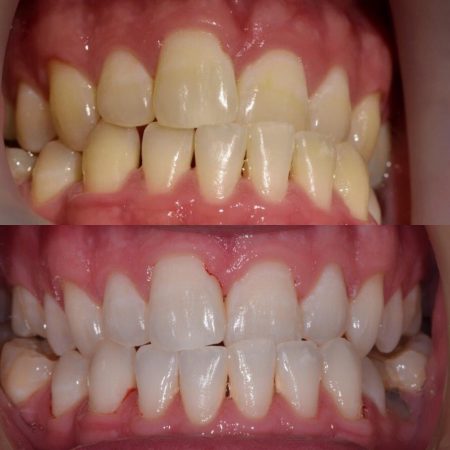Teeth whitening, teeth bleaching, teeth lightening – whatever you call it, everyone seems to be doing it. So what is this craze? Is it safe? What does it actually do to your teeth? And is it necessary for a dentist to oversee the process? All of your questions and more answered in one simple post.
Can anyone whiten their teeth?
Sometimes whitening is a suitable procedure that can have excellent results. However, it is not suitable for everyone.
If you haven’t been to the dentist for a while…
It is essential your dentist undertakes a comprehensive dental examination and ensures your dental health is adequate before undertaking treatment.
This is to ensure:
- The type and reason for tooth discolouration and darkening is correctly diagnosed; and the most efficient method of lightening the teeth with the highest level of safety is advised.
- All tartar and external stains are removed from the teeth before they are bleached.
- Any leaking restorations that are likely to become sensitive as a result of the bleaching process are repaired or replaced.
If you are pregnant…
As a precaution we recommend postponing your whitening until no longer pregnant.
If you have sensitive teeth…
Your dentist will provide care and advice. In some cases, other options may need to be considered.
If you have fillings or crowns…
It is important to understand that these will not whiten. Your dentist will discuss this with you and other treatment options may instead be recommended.
How is it different from whitening toothpaste?
Most whitening toothpastes contain abrasive ingredients that remove extrinsic (surface) stains. Excessive use of these products can wear away the outer layer of your teeth and cause micro-scratches that ultimately lead to more staining.
Peroxide helps to break down intrinsic stains within the teeth to whiten them. Some whitening toothpastes do contain peroxide, but it is at such a low concentration and its contact time with the teeth is so minimal that no whitening effect is achieved.
Is teeth whitening bad for my teeth?
When administered correctly, whitening is not bad for your teeth. As the chemical used to whiten your teeth is in fact bleach, if used incorrectly or unsafely it can cause irreversible tooth death. This is often associated with improper use of heat lights which are thought to speed up the whitening process. When used properly, only a very small amount of hazardous chemicals access the dental nerve (10,000x less than what is required to cause any damage).
So in short – adverse effects may occur in inappropriate applications, abuses or with the use of inappropriate products. But your dentist can maximise the benefits of bleach whilst minimising potential risks.
Does teeth whitening hurt?
You may experience some mild sensitivity during whitening that usually goes away after 1-2 days.
Sometimes gum and mouth irritation can occur, causing a burning sensation or white gums. This is also transient and resolves in a few hours.
If you allergic to the gel solution you may experience pain, itching or swelling. If this occurs, stop using the gel immediately and visit the dentist as soon as possible.
How long does teeth whitening take?
It varies between person to person and depends on how long you wear the trays. Young patients are able to see great whitening effects within a fortnight if used as directed. Older patients can achieve similar results but it generally takes a bit longer. This is because as we age the yellow dentine layer of the tooth thickens whilst the translucent enamel layer thins, resulting in darker looking teeth.

Results of tooth whitening in an older adult patient of Cameron Dental Care

Tooth Whitening results in a young adult patient at Cameron Dental Care
Can I still drink coffee when whitening my teeth?
Avoid drinking coffee (and other heavily staining foods and drinks such as red wine, tea, soy sauce, bolognese and berries) for one hour after the whitening.
What if I am a smoker?
If you are interested in whitening your teeth it is a good idea to stop smoking first. Certainly, your dentist will not offer tooth whitening unless you at least ‘postpone’ smoking through the course of your treatment. Smoking during or after your whitening treatment dramatically relapses the whitening effect.
How long does teeth whitening last?
Your whitening effect may diminish over time with repeated exposure to pigments in food and drink that stain your teeth. You may choose to repeat the whitening process when needed to maintain your desired level of whiteness.
And for the more scientifically inclined… How does teeth whitening work?!
Peroxide flows freely through the enamel and dentine of the tooth due to its low molecular weight and generates free radicals. These free radicals oxidise the tooth pigments into smaller, less pigmented constituents like carboxylic acids and alcohols. Thus the structure of the discoloured areas of the tooth changes from complex to simple Carbon bonds, resulting in more reflection and less absorption of light, and a whiter looking tooth.
HAVE A QUESTION WE HAVEN’T ANSWERED HERE? Email us at info@camerondentalcare.com
